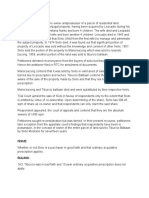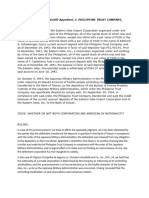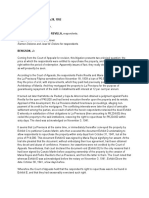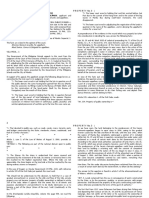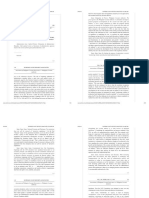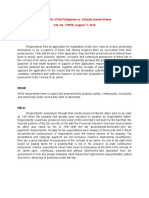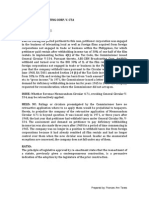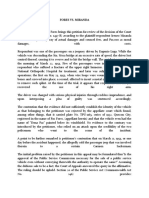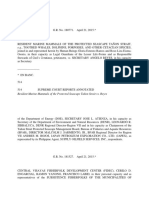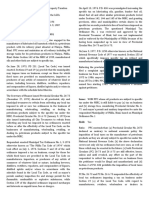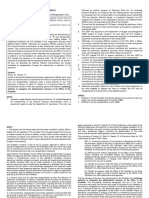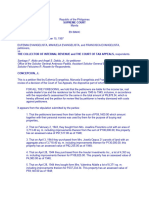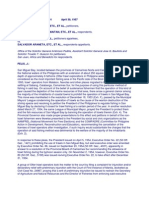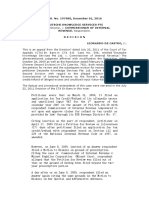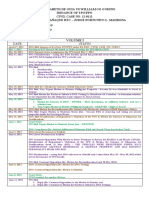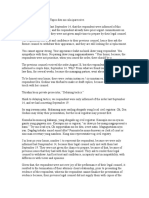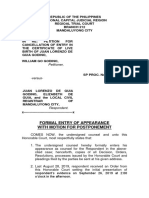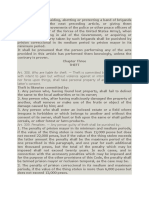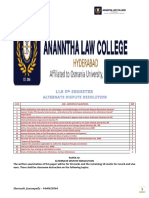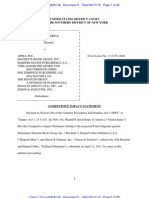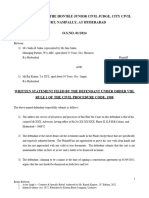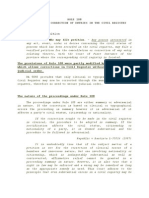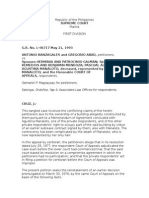G.R. No.
L-16704 March 17, 1962
VICTORIAS MILLING COMPANY, INC., petitioner-appellant,
vs.
SOCIAL SECURITY COMMISSION, respondent-appellee.
BARRERA, J.:
Facts
The Social Security Commission issued Circular No. 22 on October 15, 1958 requiring all employers in
computing premiums to include employee’s remuneration all bonuses and overtime time pay, as well as the
cash value of other media remuneration.
The petitioner(Victorias Milling Company, Inc.) protest against the circular as it is contrary to a previous
Circular No. 7 dated October 7, 1957.
Circular No. 7 excludes overtime pay and bonus in the computation of the employers’ and the employees’
respective monthly premium contributions.
The counsel questioned the validity of the circular
Social Security Commission overruled the objections
Victorias Miller Company Inc. comes to court on appeal
Issue
Whether or not Circular No. 22 is a rule or regulation as contemplated in Section 4(a) of Republic Act 1161
empowering the Social Security Commission “to adopt, amend and repeal subject to the approval of the
President such rules and regulations as may be necessary to carry out the provisions and purposes of this Act”
Held
Republic Act No. 1161 before its amendment defines compensation as: All remuneration for employment
include the cash value of any remuneration paid in any medium other than cash. Except:
that part of the remuneration in excess of P500 received during the month;
bonuses, allowances or overtime pay; and
dismissal and all other payments which the employer may make, although not legally required to do so.
Republic Act No. 1792 changed the definition of “compensation” to: (f) Compensation — All remuneration for
employment include the cash value of any remuneration paid in any medium other than cash except that part
of the remuneration in excess of P500.00 received during the month.
Circular No. 22 was issued to advise the employers and employees concerned with the interpretation of the
law as amended which was Social Security Commission’s duty to enforce. The Commission simply stated their
opinion as to how the law should be construed and that such circular did not require presidential approval and
publication in the Official Gazette for its effectivity. Whereas if it renders an opinion or a statement of policy, it
merely interprets a pre-existing law. Administrative interpretation of law is at best merely advisory for it is the
courts that finally determine what the law means.
IN VIEW OF THE FOREGOING, the Resolution appealed from is hereby affirmed, with costs against appellant.
So ordered.
�Amadora vs. CA
GR No. L47745, April 15, 1988
Facts: Like any prospective graduate, Alfredo Amadora was looking forward to the commencement exercises
where he would ascend the stage and in the presence of his relatives and friends receive his high school
diploma. As it turned out, though, fate would intervene and deny him that awaited experience. While they were
in the auditorium of their school, the Colegio de San Jose-Recoletos, a classmate, Pablito Damon, fired a gun
that mortally hit Alfredo, ending all his expectations and his life as well.
Daffon was convicted of homicide thru reckless imprudence. Additionally, the herein petitioners, as the victim's
parents, filed a civil action for damages under Article 2180 of the Civil Code against the Colegio de San Jose-
Recoletos, its rector the high school principal, the dean of boys, and the physics teacher, together with Daffon
and two other students, through their respective parents. The complaint against the students was later
dropped. After trial, the CIF of Cebu held the remaining defendants liable to the plaintiffs. On appeal to the
respondent court, however, the decision was reversed and all the defendants were completely absolved.
Issue: Whether or not teachers or heads of establishments of arts and trades shall be liable for the death of
Alfredo Amadora.
Ruling: The Court has come to the conclusion that the provision in question (Art. 2180) should apply to all
schools, academic as well as non-academic.
Following the canon of reddendo singular singuli, where the school is academic, responsibility for the tort
committed by the student will attach to the teacher in charge of such student. This is the general rule. Reason:
Old academic schools, the heads just supervise the teachers who are the ones directly involved with the
students.
Where the school is for arts and trades, it is the head and only he who shall be held liable as an exception to
the general rule. Reason: Old schools of arts and trades saw the masters or heads of the school personally
and directly instructed the apprentices.
Therefore, the heads are not liable. The teacher-in-charge is not also liable because there’s no showing that he
was negligent in enforcing discipline against the accused or that he waived observance of the rules and
regulations of the school, or condoned their non-observance. Also, the fact that he wasn’t present can’t be
considered against him because he wasn’t required to report on that day. Classes had already ceased.
�AMADORA et al vs. CA et al
G.R. No. L-47745
April 15, 1988
Cruz, J:
FACTS: Alfredo Amadora was shot by a gun fired by his classmate Daffon while in the Colegio de San Jose-
Recoletos Auditorium at a date after the semester ended. He was there to submit a graduation requirement in
Physics.
Daffon was convicted of homicide thru reckless imprudence . Additionally, the herein petitioners, as the victim’s
parents, filed a civil action for damages under Article 2180 of the CC against the Colegio de San Jose-
Recoletos, its rector the high school principal, the dean of boys, and the physics teacher, together with Daffon
and two other students, through their respective parents.
The complaint against the students was later dropped. After trial, the CFI of Cebu held the remaining
defendants liable to the plaintiffs, representing death compensation, loss of earning capacity, costs of litigation,
funeral expenses, MD, ED and AF.
On appeal to the respondent court, however, the decision was reversed and all the defendants were
completely absolved. Hence this petition for certiorari under Rule 45 of the Rules of Court.
In its decision the respondent court found that Article 2180 was not applicable as the Colegio de San Jose-
Recoletos was not a school of arts and trades but an academic institution of learning. It also held that the
students were not in the custody of the school at the time of the incident as the semester had already ended.
ISSUE: how should Art. 2180 be applied in this case
HELD: the petition is DENIED. The rector, the high school principal and the dean of boys cannot be held liable
because none of them was the teacher-in-charge as previously defined. Colegio de San Jose-Recoletos
cannot be held directly liable under the article because only the teacher or the head of the school of arts and
trades is made responsible for the damage caused by the student or apprentice
Art. 2180. The obligation imposed by Article 2176 is demandable not only for one’s own acts or omissions, but
also for those of persons for whom one is responsible.
xx
Lastly, teachers or heads of establishments of arts and trades shall be liable for damages caused by their
pupils and students or apprentices, so long as they remain in their custody.
The responsibility treated of in this article shall cease when the persons herein mentioned prove that they
observed all the diligence of a good father of a family to prevent damage.
After an exhaustive examination of the problem, the Court has come to the conclusion that the provision in
question should apply to all schools, academic as well as non-academic. Where the school is academic rather
than technical or vocational in nature, responsibility for the tort committed by the student will attach to
the teacher in charge of such student, following the first part of the provision. This is the general rule. In the
case of establishments of arts and trades, it is the head thereof, and only he, who shall be held liable as
an exception to the general rule.
As stated in the dissent of Justice J.B.L. Reyes in the Exconde Case, under Art. 2180, he said, was imposed
on (1) teachers in general; and (2) heads of schools of arts and trades in particular. The modifying clause “of
establishments of arts and trades” should apply only to “heads” and not “teachers.”
�But of course, as long as the defendant can show that he had taken the necessary precautions to prevent the
injury complained of, he can exonerate himself from the liability imposed by Article 2180, as stated in its last
paragraph.
In this connection, it should be observed that the teacher will be held liable not only when he is acting in loco
parentis for the law does not require that the offending student be of minority age. Unlike the parent, who wig
be liable only if his child is still a minor, the teacher is held answerable by the law for the act of the student
under him regardless of the student’s age
In any event, it should be noted that the liability imposed by this article is supposed to fall directly on the
teacher or the head of the school of arts and trades and not on the school itself. If at all, the school, whatever
its nature, may be held to answer for the acts of its teachers or even of the head thereof under the general
principle of respondeat superior, but then it may exculpate itself from liability by proof that it had exercised the
diligence of a bonus paterfamilias.The school can show that it exercised proper measures in selecting the head
or its teachers and the appropriate supervision over them in the custody and instruction of the pupils pursuant
to its rules and regulations for the maintenance of discipline among them.
The other matter to be resolved is the duration of the responsibility of the teacher or the head of the school of
arts and trades over the students. Is such responsibility co-extensive with the period when the student is
actually undergoing studies during the school term, as contended by the respondents and impliedly admitted
by the petitioners themselves?
This does not necessarily mean that such, custody be co-terminous with the semester, beginning with the start
of classes and ending upon the close thereof, and excluding the time before or after such period, such as the
period of registration, and in the case of graduating students, the period before the commencement exercises
[During such periods, the student is still subject to the disciplinary authority of the school and cannot consider
himself released altogether from observance of its rules.]In the view of the Court, the student is in the custody
of the school authorities as long as he is under the control and influence of the school and within its premises,
whether the semester has not yet begun or has already ended.
As long as it can be shown that the student is in the school premises in pursuance of a legitimate student
objective, in the exercise of a legitimate student right, and even in the enjoyment of a legitimate student right,
and even in the enjoyment of a legitimate student privilege, the responsibility of the school authorities over the
student continues. Indeed, even if the student should be doing nothing more than relaxing in the campus in the
company of his classmates and friends and enjoying the ambience and atmosphere of the school, he is still
within the custody and subject to the discipline of the school authorities under the provisions of Article 2180.
NOTES:
The reason for the disparity [distinction of who should be responsible for students between academic and arts
and trades schools] can be traced to the fact that historically the head of the school of arts and trades
exercised a closer tutelage over his pupils than the head of the academic school. The old schools of arts and
trades were engaged in the training of artisans apprenticed to their master who personally and directly
instructed them on the technique and secrets of their craft. By contrast, the head of the academic school was
not as involved with his students and exercised only administrative duties over the teachers who were the
persons directly dealing with the students. The head of the academic school had then (as now) only a vicarious
relationship with the students. Consequently, while he could not be directly faulted for the acts of the students,
the head of the school of arts and trades, because of his closer ties with them, could be so blamed.
It is conceded that the distinction no longer obtains at present in view of the expansion of the schools of arts
and trades, the consequent increase in their enrollment, and the corresponding diminution of the direct and
personal contract of their heads with the students. Article 2180, however, remains unchanged. In its present
state, the provision must be interpreted by the Court according to its clear and original mandate until the
legislature, taking into account the charges in the situation subject to be regulated, sees fit to enact the
necessary amendment.
�Matuguina Integrated Wood Products Inc. v CA
G.R. No. 98310 – 263 SCRA 490 – Political Law – Due Process – Right to Be Heard – Not Being Party to a
Case
In 1973, license was issued to Milagros Matuguina to operate logging businesses under her group Matuguina
Logging Enterprises. MIWPI was established in 1974 with 7 stockholders. Milagros Matuguina became the
majority stockholder later on. Milagros later petitioned to have MLE be transferred to MIWPI. Pending approval
of MLE’s petition, Davao Enterprises Corporation filed a complaint against MLE before the District Forester
(Davao) alleging that MLE has encroached upon the area allotted for DAVENCOR’s timber concession. The
Investigating Committee found MLE guilty as charged and had recommended the Director to declare that MLE
has done so. MLE appealed the case to the Ministry of Natural Resources. Â During pendency, Milagrosa
withdrew her shares from MIWPI. Later, MNR Minister Ernesto Maceda found MLE guilty as charged. Pursuant
to the finding, DAVENCOR and Philip Co requested Maceda to order MLE and/or MIWPI to comply with the
ruling to pay the value in pesos of 2352.04 m3 worth of timbers. The Minister then issued a writ of execution
against MIWPI. MIWPI filed a petition for prohibition before the Davao RTC. The RTC ruled in favor of MIWPI
and has ordered to enjoin the Minister from pursuing the execution of the writ. DAVENCOR appealed and the
CA reversed the ruling of the RTC. MIWPI averred that it is not a party to the original case (as it was MLE that
was sued – a separate entity). That the issuance of the order of execution by the Minister has been made not
only without or in excess of his authority but that the same was issued patently without any factual or legal
basis, hence, a gross violation of MIWPI’s constitutional rights under the due process clause.
ISSUE: Whether or not MIWPI’s right to due process has been violated.
HELD: The SC ruled in favor of MIWPI. Generally accepted is the principle that no man shall be affected by
any proceeding to which he is a stranger, and strangers to a case not bound by judgment rendered by the
court. In the same manner an execution can be issued only against a party and not against one who did not
have his day in court. There is no basis for the issuance of the Order of Execution against the MIWPI. The
same was issued without giving MIWPI an opportunity to defend itself and oppose the request of DAVENCOR
for the issuance of a writ of execution against it. In fact, it does not appear that MIWPI was at all furnished with
a copy of DAVENCOR’s letter requesting for the Execution of the Minister’s decision against it. MIWPI was
suddenly made liable upon the order of execution by the respondent Secretary’s expedient conclusions that
MLE and MIWPI are one and the same, apparently on the basis merely of DAVENCOR’s letter requesting for
the Order, and without hearing or impleading MIWPI. Until the issuance of the Order of execution, MIWPI was
not included or mentioned in the proceedings as having any participation in the encroachment in
DAVENCOR’s timber concession. This action of the Minister disregards the most basic tenets of due process
and elementary fairness. The liberal atmosphere which pervades the procedure in administrative proceedings
does not empower the presiding officer to make conclusions of fact before hearing all the parties concerned.
(1996 Oct 24)
�MUSTANG LUMBER v. CA
G.R Nos. 104988, 106424, 123784
Ponente: J. Davide Jr.
FACTS:
On 1 April 1990, acting on an information that a huge stockpile of narra flitches, shorts, and slabs were seen
inside the lumberyard of the petitioner in Valenzuela, Metro Manila, DENR organized a team of foresters and
policemen and sent it to conduct surveillance at the said lumberyard. In the course thereof, the team members
saw coming out from the lumberyard the petitioner's truck, loaded with lauan and almaciga lumber of assorted
sizes and dimensions. Since the driver could not produce the required invoices and transport documents, the
team seized the truck together with its cargo and impounded them at the DENR compound at Visayas Avenue,
Quezon City. The team was not able to gain entry into the premises because of the refusal of the owner.
On 3 April 1990, the team was able to secure a search warrant from Executive Judge Adriano R. Osorio of the
Regional Trial Court (RTC) of Valenzuela, Metro Manila. By virtue thereof, the team seized on that date from
the petitioner's lumberyard four truckloads of narra shorts, trimmings, and slabs; a negligible number of narra
lumber; and approximately 200,000 board feet of lumber and shorts of various species including almaciga and
supa.
On 4 April 1990, the team returned to the premises of the petitioner's lumberyard in Valenzuela and placed
under administrative seizure the remaining stockpile of almaciga, supa, and lauan lumber with a total volume of
311,000 board feet because the petitioner failed to produce upon demand the corresponding certificate of
lumber origin, auxiliary invoices, tally sheets, and delivery receipts from the source of the invoices covering the
lumber to prove the legitimacy of their source and origin.
The petitioner's question the seizure contending that the possession of lumber, as opposed to timber, is not
penalized in Section 68 of P.D. No. 705, as amended, and even granting arguendo that lumber falls within the
purview of the said section, the same may not be used in evidence against him for they were taken by virtue of
an illegal seizure.
ISSUE:
Whether the contention of the petitioner is correct that lumber is different from timber
HELD:
No,
The Supreme Court held that the Revised Forestry Code contains no definition of either timber or lumber.
While the former is included in forest products as defined in paragraph (q) of Section 3, the latter is found in
paragraph (aa) of the same section in the definition of "Processing plant."
Lumber is a processed log or processed forest raw material.
The Code uses the term lumber in its ordinary or common usage. In the 1993 copyright edition of Webster's
Third New International Dictionary, lumber is defined, inter alia, as "timber or logs after being prepared for the
market."
Simply put, lumber is a processed log or timber. It is settled that in the absence of legislative intent to the
contrary, words and phrases used in a statute should be given their plain, ordinary, and common usage
meaning.
And insofar as possession of timber without the required legal documents is concerned, Section 68 of P.D. No.
705, as amended, makes no distinction between raw or processed timber. Neither should we.
�Gatchalian v. COMELEC, G.R. No. 32560, 22 October 1970
General words construed generally
Facts:
Pursuant to the request of the advertising firms and associations of the Philippines, COMELEC promulgated Resolution
No. RR 707 which states that “donations of billboards to the Commission by foreigners or companies or corporations
owned and controlled partially or wholly by foreigners are not covered by Section 56 of the Revised Election Code.” The
body also issued Resolution RR-731 which states that the ban in Section 46 of the Revised Election Code, as amended,
does not cover campaign funds and other contributions by the Advertising Council of the Philippines and other
contributions by the Advertising Council of the Philippines and others similarly situated, during the 120 days immediately
preceding a regular or special election.
Petitioner, as a candidate in the election for delegates to the Constitutional Convention, filed a complaint with the
COMELEC assailing the validity of the both resolutions, alleging that both are violative of Section 56 of the Revised
Election Code, as amended, which provides that:
No foreigner shall aid any candidate, directly or indirectly, or to take part in or to influence in any manner any elections.
The prohibited active intervention of foreigners thereunder may consist of:
(1) aiding any candidate, directly or indirectly, in any election;
(2) taking part in any election; and
(3) influencing in any manner any election.
The COMELEC, however, denied the petitioner’s motion, declaring "that contributions by foreigners to the COMELEC
Billboards Committee for the purpose of financing costs of COMELEC billboards are not made in aid or support of any
particular candidate in a particular district and that the allocation of space for its candidate is allowed by lottery, nor would
it in any way influence the result of the election, ... .He then filed an appeal with the Court, contending that said order of
the COMELEC is null and void as contrary to law or having been issued in excess of the powers of the Commission on
Elections or in grave abuse of its discretion, and praying for a writ of preliminary as well as permanent injunction.No
restraining order was issued as COMELEC itself did not implement the said resolution.
Issue:
Whether or not the term “any elections,” “foreigner,” and “any candidate;” as well as the terms “aid,” “take part,” and
“influence,” as contemplated In Section 56 of the Revised Election Code, had other meanings
Held:
The term “any elections” definitely comprehends or applies to election of delegates Constitutional Convention. “Foreigner,”
on the other hand, refers to both natural and juridical persons or associations or organized groups, as provided by Section
39 of Article 3 of the Revised Election Code, broadening the application of the term and not limiting the prohibition to
natural persons only. “Any candidate” likewise comprehends ‘some candidates’ or ‘all candidates.’ The terms “aid,” “to
take part,” and “influence,” were also construed in their general sense- with “aid” referring to to support, to help, to assist
or to strengthen or to act in cooperation with; "to take part" means to participate or to engage in; and "influence" means to
use the party's endeavors, though he may not be able to carry his point, or to exert or have an effect on the nature or
behaviour of, or affect the action or thought of, or modify; or to sway; to persuade; to affect; to have an effect on the
condition or development of; to modify or act upon physically, especially in some gentle, subtle, or gradual way; or to exert
or maintain a mental or moral power upon or over; to effect or sway by modifications, feelings or conduct.
There is nothing in the Revised Election Code which impliedly or expressly prescribes a different meaning to the
aforementioned terms. Hence, they should be understood in their general sense. There was likewise no manifest or
expressed intention that the meaning of the words were to be restricted or limited.Where general terms are used, the
terms are to be understood in their general meaning, unless it is expressed that they have acquired a special and
restricted meaning. Hence, in this case, “generaliaverbasuntgeneraliterintelligenda” applies.
The billboard contributions may not specifically favor a single candidate, but the effect that all candidates benefit from the
contribution amounts to an assistance greater than the aid that may be given to one candidate. Allowing such undesirable
alien influence will inevitably lead to a circumvention of the laws protecting our national interest. The practice allegedly
condoned by the COMELEC in the subject resolutions, therefore, constitute a violation of the Revised Election Code.The
law penalizing corrupt election practices should be given a reasonable construction in the interests of the purity of the
elections. The resolutions of the Commission on Elections Nos. RR-707 and 731 promulgated respectively on August 13,
1970 and September 17, 1970 are therefore declared illegal and null and void.
�Vargas v Rillaroza
G.R. No. L-1612 February 26 1948 [Composition of the Supreme Court, ]
FACTS:
Petitioner assails the validity of Sec. 14 of the The People's Court Act, Commonwealth Act 682, which provided
that the President could designate Judges of First Instance, Judges-at-large of First Instance or Cadastral
Judges to sit as substitute Justices of the Supreme Court in treason cases without them necessarily having to
possess the required constitutional qualifications of a regular Supreme Court Justice.
ISSUE: Whether or not Sec. 14 of CA 682 is constitutional
RULING:
No. Sec. 14 of CA 582 is unconstitutional.
Article VIII, sections 4 and 5, of the Constitution do not admit any composition of the Supreme Court other than
the Chief Justice and Associate Justices therein mentioned appointed as therein provided. And the
infringement is enhanced and aggravated where a majority of the members of the Court — as in this case —
are replaced by judges of first instance. It is distinctly another Supreme Court in addition to this. And the
constitution provides for only one Supreme Court.
Grounds for disqualification added by section 14 of Commonwealth Act No. 682 to those already existing at the
time of the adoption of the Constitution and continued by it is not only arbitrary and irrational but positively
violative of the organic law.
Constitutional requirement (Art. VIII Sec 5) provides that the members of the Supreme Court should be
appointed by the President with the consent of the CoA, "Unless provided by law" in Sec 4 cannot be
construed to authorize any legislation which would alter the composition of the Supreme Court, as determined
by the Constitution.
However temporary or brief may be the participation of a judge designated under Sec. 14 of PCA, there is no
escaping the fact the he would be participating in the deliberations and acts of the SC, as the appellate
tribunal, and his vote would count as much as that any regular Justice of the Court. "A temporary member"
therefore would be a misnomer, as that position is not contemplated by the Constitution, where Sec.4 of Art.
VIII only provides A Chief Justice and Associate Justices who have to be thus appointed and confirmed
(Sec5).
�Republic Flour Mills vs Commissioner of Customs and CTA
G.R. No. L-28463 May 31, 1971
FERNANDO, J.
Petition for the review of a decision of respondent Court of Tax Appeals
FACTS: Republic Flour Mills (RFM) were importing wheat to produce flour. During the process of transforming
wheat into flour, bran (ipa) and pollard (darak) were also produced. RFM were exporting bran and pollard but
they were not paying wharfage dues because RFM were referring to them as wastes and not products. RFM
interpreted Section 2802 of the Tariff and Custom Code referring only to “products of the Philippines” that are
to be levied, etc. Hence, RFM did not agree with the CTA’s decision that a collection of wharfage dues must be
given for exporting them.
ISSUE: Whether or not such collection of wharfage dues was in accordance with law.
HELD: Yes. Under Section 2802 of the Tariff and Customs Code, it stated that: “There shall be levied,
collected and paid on all articles imported or brought into the Philippines, and on products of the Philippines…
exported from the Phils., a charge of two pesos per gross metric ton as a fee for wharfage…” – which simply
means that as long as the goods are produced in the country, they fall within the terms of the above section.
Hence, the Supreme Court affirmed the decision of the Court of Tax Appeals.
�San Miguel Corp. VS Mandaue
467 SCRA 107 [Aug. 16, 2005]
Facts
-CA affirmes DOLE Undersecretary for Labor Relations, Rosalinda Dimapilis-Baldoz, ordering the immediate
conduct of a certification election among the petitioner’s rank-and-file employees.
-Federation of Free Workers (FFW/ respondent) filed a petition for certification election with the DOLE
Regional Office No. VII. It sought to be certified and to represent the permanent rank-andfile monthly paid
employees of the petitioner. The following documents were attached to the petition: (1)
a Charter Certificate certifying that respondent as of that date was duly certified as a local or chapter of FFW;
(2) a copy of the constitution of respondent prepared by its Secretary, Noel T. Bathan and attested by its
President, Wilfred V. Sagun; (3) a list of respondent’s officers and their respective addresses, again prepared
by Bathan and attested by Sagun; (4) a certification signifying that respondent had just been organized and no
amount had yet been collected from its members, signed by respondent’s treasurer Chita D. Rodriguez and
attested by Sagun; and (5) a list of all the rank-and-file monthly paid employees of the Mandaue Packaging
Products Plants and Mandaue Glass Plant prepared by Bathan and attested by Sagun. -SMC (Petitioner) filed
a motion to dismiss the petition for certification election on the sole ground that herein respondent is not listed
or included in the roster of legitimate labor organizations based on the certification issued by the Officer-In
representative, then right to be represented by a bargaining agent should not be denied to other members of
the bargaining unit.”
HELD
1. NO. Ratio EFFECT NON-PARTICIPIATION PREVIOUS ELECTION. No law, administrative rule or
precedent prescribes forfeiture of the right to vote by reason of neglect to exercise the right in past certification
elections.
2. NO. Ratio RELIGION/PAST NON-PARTICIPATION. Neither law, administrative rule nor jurisprudence
requires that only employees affiliated with any labor organization may take part in a certification election. On
the contrary, the plainly discernible intendment of the law is to grant the right to vote to all bona fide employees
in the bargaining unit, whether they are members of a labor organization or not.
6.3.
CERTIFICATION ELECTIONPROCESS
1. The Union as Initiating Party ART. 212. Definitions. -(h) “Legitimate labor organization” means any labor
organization duly registered with the Department of Labor and Employment, and includes any branch or local
thereof. Charge, Regional Director of the DOLE Regional Office No. VII, Atty. Jesus B. Gabor.
-Respondent submitted to the Bureau of Labor Relations the same documents earlier attached to its petition for
certification. The accompanying letter, signed by respondent’s president Sagun, stated that such documents
were submitted in compliance with the requirements for the creation of a local/chapter pursuant to the Labor
Code and its Implementing Rules; and it was hoped that the submissions would facilitate the listing of
respondent under the roster of legitimate labor organizations.The Chief of Labor Relations Division of DOLE
Regional Office No. VII issued a Certificate of Creation of Local/Chapter No. ITD. I-ARFBT-058/98, certifying
that from 30 July 1998, respondent has acquired legal personality as a labor organization/worker’s association,
it having submitted all the required documents.
Malanyaon v. Lising
�Facts:
Mayor Pontanal was charged with violation of RA 3019 (Anti-Graft and Corrupt Practices Act). He was
suspended from office but he died during his incumbency, and while the case was pending. The case was
dismissed due to his death. Petitioner sought the payment of the Mayor's salary during his period of
suspension pursuant to Section 13 of RA 3019 which provides - should a public officer be convicted by final
judgement he shall lose all retirement or gravity benefits under any law, but if he is acquitted he shall
be entitled to reinstatement and to the salaries and benefits to which he failed to receive during his suspension.
Malanyaon was a member of the Sangguniang Bayan of Bula, Camarines Sur. He filed an action to declare
illegal the disbursement made by Goleta as Municipal Treasurer to the widow of Mayor Pontanal a portion of
the salary of the late Mayor as such Mayor of such municipality during the period of his suspension from
August 16, 1977 up to November 28, 1979. However, Judge Lising dismissed the action on the ground that the
criminal case against Mayor Pontanal due to his death amounted to acquittal.
Issue:
Whether or not the dismissal of the case due to the death of the accused constitutes acquittal.
Held:
No. It is obvious that the statute speaks of the suspended officer being "acquitted". It means that after due
hearing and consideration of the evidence against him the court is of the opinion that his guilt has not been
proved beyond reasonable doubt. Dismissal of the case against the suspended officer will not suffice because
dismissal does not amount to acquittal.
Chang Yung Fa, et al. v. Gianzon, etc. and De la Cruz, etc. Case No. 19 G.R. No. L-7785 (November 25,
1955)
�FACTS: Petitioners were admitted to the Philippines on pre-arranged employment as immigrants under C.A.
No. 613 with the express condition that their stay shall be limited to two years. An amendatory law was then
passed which changes the classification of pre-arranged employees from immigrants to non-immigrants.
Petitioners contend that having been classified as “non-quota immigrants”, they should have been admitted for
permanent residence in this country because the word “immigrant” is defined to be a person who comes into a
country for a permanent residence.
ISSUE: W/N the word “immigrant” only refers to a person who comes into a country for a permanent residence.
HELD: The only definition given by our law to the term "immigrant" is: "any alien departing from any place
outside the Philippines destined for the Philippines, other than a nonimmigrant." The law gives no definition to
the term "nonimmigrant" from which we may imply that the term "immigrant" is merely intended to include any
alien coming to this country for permanent residence as now contended by appellants. A review of the whole
law would disclose no such intention which denotes that the purpose of the law is to give broad power to the
Commissioner of Immigration on matters pertaining to the admission of immigrants into the Philippines.
C & C Commercial v. NAWASA Case No. 42 G.R. No. L-27275 (November 18, 1967) Chapter VI, Page 274,
Footnote No. 107
FACTS: NAWASA conducted three separate bids for the three different waterworks projects in Manila, Davao
and Iloilo. However, C & C Commercial Corporation, one of those who participated in the bidding but
eventually lost, filed three corresponding supplemental complaints on each of the aforesaid waterworks
projects contending that NAWASA violated Sec. 1 of RA 912, which should give preference to local materials
that are available, practicable and usable. The said law also provides that this nationalistic policy of preferring
for locally produced materials is in relation to the “construction or repair work undertaken by the Government.”
NAWASA alleged that it should not be included within the meaning of the term “Government” as used in the
said law.
ISSUE: W/N NAWASA falls under the term “government” under RA 912.
HELD: Yes. The NAWASA should be deemed embraced within the term “government” found in RA 312, and in
the construction of their works or purchase of materials thereof, local material should be given preference
whenever available, practicable and usable. Government-owned or controlled corporations are not exempted
from RA 912. Two laws are being considered in this case: C.A. No. 138 and RA 912. Both relate to the same
subject matter and have the same nationalistic purpose or object which is to give preference to locally
produced materials in purchases, works or projects of the Government (referring to Filipino-First policy).
Republic Flour Mills, Inc v. Commissioner of Customs Case No: 258 G. R. No. L-28463 (May 31, 1971)
Chapter V, Page 184, Footnote No.39
�FACTS: This is a petition for review of the decision of the Court of Tax Appeals in which they found in Sec.
2802 of the Tariff and Customs Code. Petitioner was assessed wharfage dues for the exportation of bran (ipa)
and pollard (darak) under Sec. 2802 of the Tariff and Customs Code which states: “There shall be levied
collected and paid on products of the Philippines… exported from the Philippines, a charge of 2 pesos per
gross metric ton as a fee for wharfage”
ISSUE: W/N the words “products of the Philippines” excludes bran and pollard on the ground that they are from
wheat grain, which is imported into the Philippines.
HELD: No. Even without undue scrutiny it does appear quite obvious that as long as the goods are produced in
the country, they fall within the terms of the above section. The law is clear; it must be obeyed. The Term
“product of the Philippines” should be taken in its usual signification to mean any product produced in the
country; hence, bran(ipa) and pollard(darak) produced from wheat imported into the country are “products of
the Philippines.
Asiatic Petroleum Co. v. Collector of Internal Revenue Case No. 10 G.R. No. 12687 (August 27, 1918)
Chapter V, Page 187, Footnote No.47
FACTS: The Defendant, under threat of penalty, compelled the Plaintiff to pay the Internal Revenue Tax
provided for under Sec. 17 of Act No. 2432 upon all such oils which the plaintiff had on hand on the 1st day of
January, 1915. The tax was paid under protest. The Plaintiff contends that the tax collected was illegal. Sec. 17
Par 72a of Act No. 2432 provides that “no tax (imposed by this law) shall be collected on such articles which,
before the taking effect of this Act, shall have been disposed of to consumers or persons other than
manufacturers or wholesale dealers.” Said Act took effect upon the 1st day of January, 1915.
ISSUE: W/N a dealer is required to pay the Internal Revenue Tax, provided for under Sec. 17 Par 72a of Act
No. 2432, upon mineral oils, composed of kerosene and gasoline which had been sold, but not delivered, prior
to the 1st day of January 1915.
HELD: No. The Legislature evidently intended, by said phrase, to mean that merchandise “dispose of” had
been sold. The Legislature, by Act No. 2445, fully recognized that the phrase “disposed of” meant nothing
more or less than a contract whereby the vendor was bound to furnish an article, because in said Act it
provided that the purchaser, and not the vendor, was subject to pay such tax in the absence of stipulations to
the contrary. The phrase “disposed of” as used in Sec. 17 of Act No. 2432, should be given its commercial
sense and not a technical interpretation.
Manila Herald Publishing Co v. Ramos Case No. 163 G. R. No. L-4268 (January 18, 1951) Chapter V, Page
188, Footnote No.51
�FACTS: Respondent filed a libel suit, docketed as Civil Case No. 11531, against Aproniano G. Borres, Pedro
Padilla and Loreto Pastor, editor, managing editor and reporter, respectively, of the Daily Record, a daily
newspaper, asking damages aggregating P90,000. With the filing of this suit, the Plaintiff secured a writ of
preliminary attachment upon putting up a P50,000 bond. The Sheriff of the City of Manila levied an attachment
upon certain office and printing equipment found in the premises of the Daily Record. Manila Herald Publishing
Co., Inc. and Printers, Inc. commenced a joint suit against the sheriff, Respondent Quirino and Respondent
Corporation, in which the former sought (1) to enjoin the defendants from proceeding with the attachment of
the properties above mentioned and (2) P45,000 damages. This suit was docketed as Civil Case No. 12263.
Respondent Judge declared that the suit, in case No. 12263, was "unnecessary, superfluous and illegal" and
so dismissed the same. He held that what Manila Herald Publishing Co., Inc., and Printers, Inc., should do was
intervene in Case No. 11531.
ISSUE: W/N Respondent Judge has authority to dismiss Case No. 12263 at the stage when it was thrown out
of court.
HELD: Yes, the right to intervene, unlike the right to bring a new action, is not absolute but left to the sound
discretion of the court to allow.
Malanyaon v. Lising et. al Case No. 160 GR No. L-56028 (July 30,1981) Chapter V, Page 188, Footnote
No.52
FACTS: A Municipal Mayor was charged with violation of RA 3019 (Anti Graft and Corrupt Practices Act). He
was suspended from office but he died during his incumbency, and while the case was pending. The case was
dismissed due to his death. Petitioner sought payment of his salary during his period of suspension pursuant to
Sec 13 of RA 3019 which provides, “Should he be convicted by final judgment he shall lose all retirement or
gratuity benefits under any law, but if he is acquitted, he shall be entitled to reinstatement and to the salaries
and benefits w/c he failed to receive during suspension”.
ISSUE: W/N the dismissal of the case due to death of the accused constitutes acquittal.
HELD: No. It is obvious that when the statute speaks of the suspended officer being "acquitted" it means that
after due hearing and consideration of the evidence against him the court found that his guilt has not been
proven beyond reasonable doubt. Dismissal of the case is not equal to acquittal of the accused. In People vs.
Salico (84 Phil. 722), " Acquittal is always based on the merits but dismissal does not decide the case on the
merits or that the defendant is not guilty.
Rura v. Lopena Case No. 139 G. R. No. L-69810-14 (June 19, 1985) Chapter 5, Page 189, Footnote No.53
�FACTS: Petitioner was accused, tried and convicted of five (5) counts of estafa committed on different dates.
The counts were consolidated and tried jointly. Only a single decision was rendered. The Petitioner then
applied for probation but was denied by the fiscal on the ground that he had been previously convicted by final
judgment of an offense. The fiscal invoked Sec. 9 of the Probation Law, which disqualifies persons who have
previously been convicted by final judgment from applying for probation. The trial court denied his application
on the belief that since the crimes were committed on different dates, he was guilty on each of those dates.
Petitioner however contends that since there is only one decision, he has not yet been previously convicted.
ISSUE: How should the word “previously” be construed?
HELD: The word “previously” refers to the date of the conviction and not to the dates of the crimes involved.
Although he was guilty of five counts of estafa, they were tried jointly and only one decision was handed down.
Hence, when Petitioner applied for Probation he had not yet had a final judgment of conviction on his record.
He is eligible for probation under such circumstances.
Krivenko v. Register of Deeds Case No. 139 G.R. No. L-360 (November 15, 1947) Chapter 5, Page 190,
Footnote No.60
FACTS: Petitioner, an alien, bought a residential lot but its registration was interrupted by the war. In 1945, he
sought to accomplish the registration but was denied by the register of deeds of Manila on the ground that he
cannot acquire land in this jurisdiction. Petitioner brought the case to the Court of First Instance of Manila
which ruled in favor of sustaining the refusal of the register of deeds.
ISSUE: W/N “residential land” falls under the phrase “agricultural lands” as stated in Article XIII of the 1935
Constitution.
HELD: Under the Constitution, aliens may not acquire private or public agricultural lands, which includes
residential lands. It may safely be presumed that what the members of the Constitutional Convention had in
mind when they drafted the Constitution was this well-known classification and its technical meaning then
prevailing. Soon after, the National Assembly revised the Public Land Law and passed C.A. No. 141 which
permits the sale of residential lots to Filipino citizens or to corporations controlled by such citizens. Such
revision is equivalent to a declaration that residential lots are considered as agricultural lands, for under the
Constitution, only agricultural lands may be alienated. In addition, the interpretation given by the Secretary of
Justice (1939) also supports the claim that “residential land” is part of “public agricultural lands”. It is clear that
the three branches of the Government have always maintained that “residential lots” are included in
“agricultural lands”. If the term "private agricultural lands" is to be construed as not including lands not strictly
agricultural, the result would not be in line with the conservative spirit of the Constitution.
Garcia v. COMELEC Case No. 109 G.R. No. 111511 (October 5, 1993) Chapter V, Footnote No.67, Page No.
192
�FACTS: In its Pambayang Kapasyahan Blg. 10, Serye 1993, the Sangguniang Bayan ng Morong, Bataan
agreed to the inclusion of the municipality of Morong as part of the Subic Special Economic Zone in accord
with Republic Act No. 7227. Respondent Commission issued two resolutions denying the petition for initiative
and referendum on the ground that its subject is merely a resolution and not an ordinance. It contends through
the Office of the Solicitor General that under the Local Government Code of 1991, a resolution cannot be the
subject of a local initiative. The same is being asserted by the respondent Sangguniang Bayan ng Morong.
ISSUE: W/N a local resolution of a municipal council can be the subject of an initiative and referendum.
HELD: The petition to review and set aside the issued COMELEC resolutions is granted because resolutions
are appropriate subjects for initiative and referendum (Sec. 32 of Art. VI of the Constitution). Also, RA 6735,
the law providing for a system on initiative and referendum, includes resolutions as among the subjects of
initiative. Although the Local Government Code does not include the word resolution in its definition, the court
holds that the definition does not limit the coverage of local initiatives to ordinances alone. Resolutions are still
proper subjects of an initiative according to the Constitution and RA 6735.



